 Installing a Pollinator Garden for Beehives at Rock Springs
Installing a Pollinator Garden for Beehives at Rock Springs
Pollinators, such as birds, bats, bees, butterflies and other beneficial insects, play a crucial role in flowering plant reproduction and in the production of most fruits and vegetables. It’s estimated that a third of all foods and beverages are delivered by pollinators. In the United States, pollination produces nearly 20 billion dollars’ worth of products annually.[i] But pollinator numbers have suffered in recent decades due to mites, pesticides, pathogens, land development and habitat fragmentation.
Thirteen years ago, this week (June 22-28) was designated as National Pollinator Week, in a step toward addressing the urgent issue of declining pollinator populations. This week has grown into an international celebration of the valuable services these small but vital creatures provide for our ecosystem.
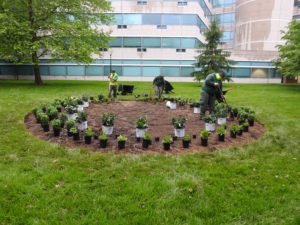 Recently, Ruppert Landscape partnered with Lincoln Property Company to install a sustainable pollinator garden to surround the newly installed beehives at Rock Springs Business Park in Bethesda, Maryland.
Recently, Ruppert Landscape partnered with Lincoln Property Company to install a sustainable pollinator garden to surround the newly installed beehives at Rock Springs Business Park in Bethesda, Maryland.
Picture left: Ruppert team members involved in the pollinator garden installation included Ever Leiva, Edwin Lizama, Mike Frazier, Grace Psenicska, Cate Deane and Adrian Durham.
Lincoln Property Company (Lincoln) partnered with Alvéole to create a sustainable property initiative for all tenants to enjoy. This initiative improves the whole customer experience and is part of Lincoln’s tenant engagement program. Alvéole works with schools and businesses in urban environments to install beehives, maintain the bees throughout the season, conduct workshops with employees and students, and harvest the honey. They had been installing beehives primarily on rooftops in the DC area and were looking to move into the outskirts of DC. The Rock Springs property was a great fit due to the abundance of green space.
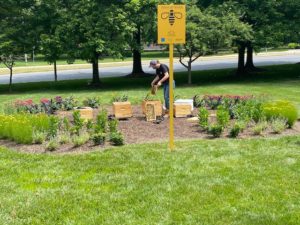 The original plan was to install the hives on the rooftop, as they had done with previous installations, but Lincoln felt that they wanted to provide better visibility to the project that would not only highlight their commitment to sustainability but would generate more visibility and interest around this environmental challenge. As such, they opted to make the installation a focal point of the Rock Springs landscape and use the honey produced by the hives as gifts for their tenants.
The original plan was to install the hives on the rooftop, as they had done with previous installations, but Lincoln felt that they wanted to provide better visibility to the project that would not only highlight their commitment to sustainability but would generate more visibility and interest around this environmental challenge. As such, they opted to make the installation a focal point of the Rock Springs landscape and use the honey produced by the hives as gifts for their tenants.
Pictured right: A member of the urban beekeeping organization, Alvéole, installing beehives in the newly planted pollinator garden.
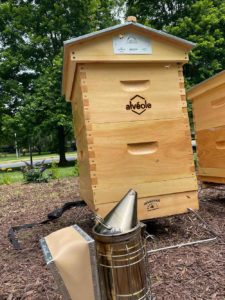 Adrian Durham, the Ruppert area manager overseeing the site’s landscape maintenance, said he first learned about the project during a site walk-through with Lincoln property manager, Netsai Matowe, and vice president, Stuart Pechner. “The pollinator garden was intended to serve a few purposes: to provide nectar for the bees; to act as a physical barrier to prevent humans from coming into contact with the hives, which are encircled by the planting; and to enhance the visual appeal of the area.”
Adrian Durham, the Ruppert area manager overseeing the site’s landscape maintenance, said he first learned about the project during a site walk-through with Lincoln property manager, Netsai Matowe, and vice president, Stuart Pechner. “The pollinator garden was intended to serve a few purposes: to provide nectar for the bees; to act as a physical barrier to prevent humans from coming into contact with the hives, which are encircled by the planting; and to enhance the visual appeal of the area.”
Adrian consulted with fellow area manager Cate Deane to select an appropriate plant palate for the project. “When Adrian came back from his client meeting with the idea for the garden, I just started reading about recommended pollinator plants and used the guide shared by Alvéole as well,” said Cate. “I tried to select as many hardy native perennials as possible to ensure that the bees would have plants to support them for years to come.”
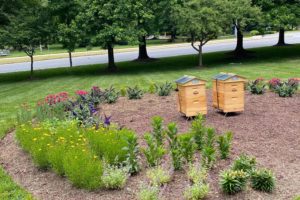 With the client’s approval, they chose an array of pollinator-friendly plant material, including Coreopsis Citrine (Tickseed), Monarda Sugar Buzz (Dwarf Bee Balm), Buddleia (Dwarf Butterfly Bush), Sedum (Stonecrop Neon) and Lobelia Cardinalis (Red Cardinal Flower). These were chosen for a several reasons, including their bright colors and nectar production to attract pollinators, and their staggered blooming cycles to provide continuous interest throughout spring, summer and fall. The mix of colors, foliage, and growth height gives the appeal of a naturalized area for tenants and pedestrians to enjoy. The garden was installed on May 22nd to give the plant material time to grow in before the hives were installed on June 16th.
With the client’s approval, they chose an array of pollinator-friendly plant material, including Coreopsis Citrine (Tickseed), Monarda Sugar Buzz (Dwarf Bee Balm), Buddleia (Dwarf Butterfly Bush), Sedum (Stonecrop Neon) and Lobelia Cardinalis (Red Cardinal Flower). These were chosen for a several reasons, including their bright colors and nectar production to attract pollinators, and their staggered blooming cycles to provide continuous interest throughout spring, summer and fall. The mix of colors, foliage, and growth height gives the appeal of a naturalized area for tenants and pedestrians to enjoy. The garden was installed on May 22nd to give the plant material time to grow in before the hives were installed on June 16th.
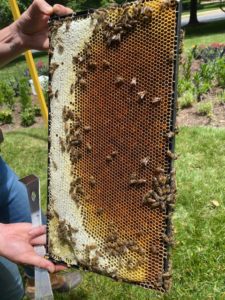 “Lincoln is very proud to be a part of this initiative. The Honeybee Garden presentation provides a wonderful addition to the property for the tenants and visitors to enjoy. We look forward to implementing this at more of the properties we manage throughout the region,” said Stuart Pechner, Vice President of Property Management with Lincoln Property Company.
“Lincoln is very proud to be a part of this initiative. The Honeybee Garden presentation provides a wonderful addition to the property for the tenants and visitors to enjoy. We look forward to implementing this at more of the properties we manage throughout the region,” said Stuart Pechner, Vice President of Property Management with Lincoln Property Company.
Pictured left: Each hive will produce approximately 100 jars of honey per season.
“It was really rewarding to be involved in a sustainable project like this that I know will have far-reaching effects on the community and the pollinator population,” said Cate.
[i] https://www.pollinator.org/pollinator.org/assets/generalFiles/Pollination-Fast-Facts-General-2020.pdf
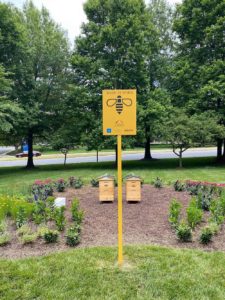 Installing a Pollinator Garden for Beehives at Rock Springs
Installing a Pollinator Garden for Beehives at Rock Springs